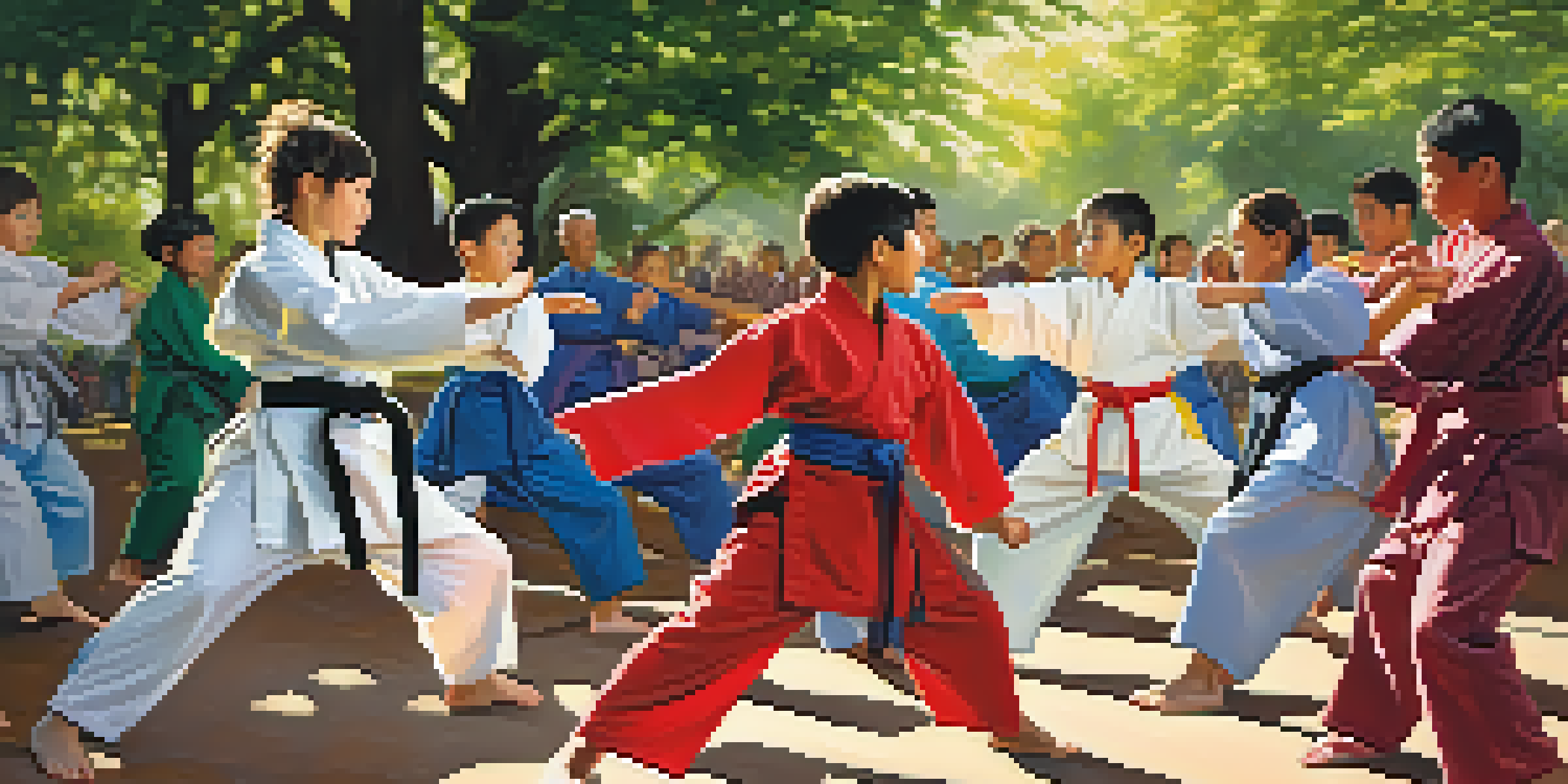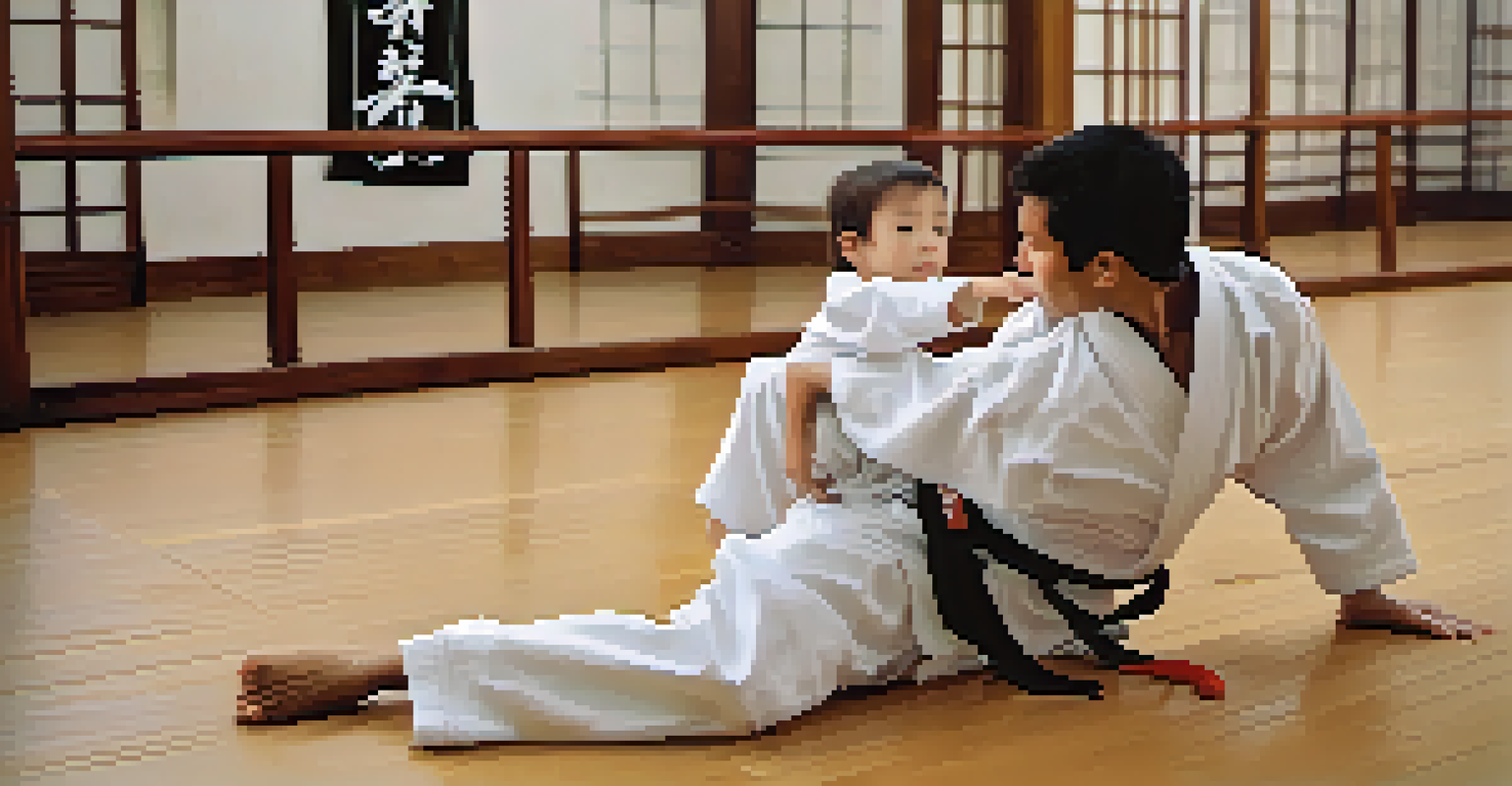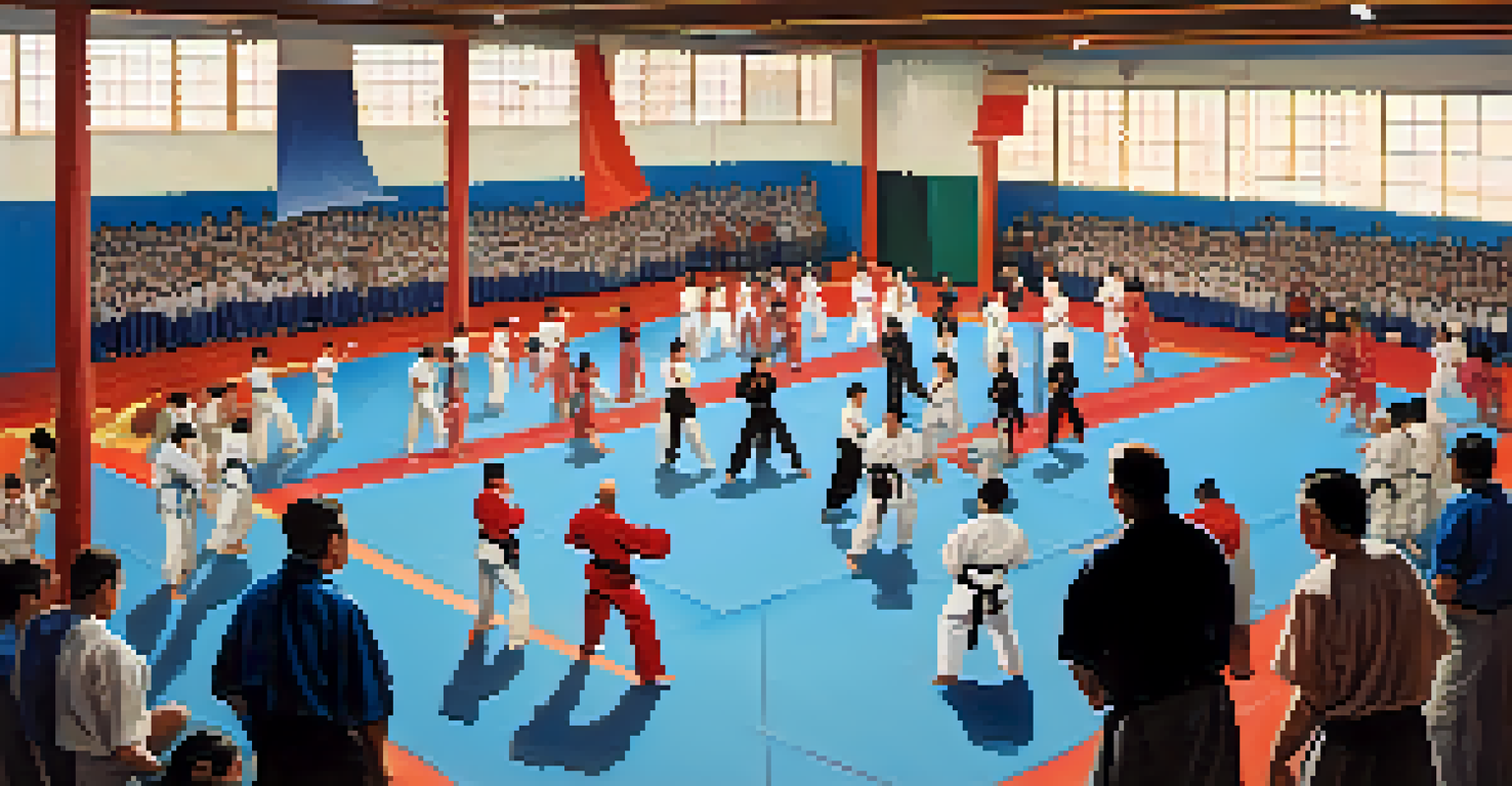Integrating Martial Arts into Community Health Projects

Understanding the Benefits of Martial Arts for Health
Martial arts encompass a variety of disciplines, such as karate, judo, and tai chi, that promote physical fitness and mental well-being. By integrating these practices into community health projects, we can address both physical health and emotional resilience. The structured movements and techniques help improve strength, flexibility, and coordination, making them ideal for individuals of all ages.
The martial arts are ultimately self-improvement disciplines that help us build character and become better human beings.
Moreover, martial arts often emphasize mindfulness and focus, which can significantly reduce stress levels. This mental aspect encourages participants to engage in self-reflection and emotional regulation, fostering overall psychological health. Communities that prioritize mental wellness alongside physical health create a more balanced approach to well-being.
Integrating martial arts into health initiatives not only promotes fitness but also encourages social interaction. Participants often form bonds and friendships, creating a supportive network that enhances community spirit. This social aspect can lead to higher retention rates in health programs, allowing for sustained engagement and long-term benefits.
Creating Inclusive Martial Arts Programs for All Ages
When designing community health projects that include martial arts, it's crucial to ensure inclusivity. Programs should cater to diverse age groups, skill levels, and physical abilities, making martial arts accessible to everyone. For instance, offering modified classes for seniors or adaptive techniques for individuals with disabilities can create a welcoming environment.

Incorporating family-oriented classes can also foster a sense of community and encourage participation across generations. Parents and children training together not only bond through shared experiences but also promote healthy habits as a family unit. This multi-generational approach can contribute to stronger community ties and improved overall health.
Martial Arts Boosts Physical Health
Engaging in martial arts enhances physical fitness, strength, and endurance while promoting healthier lifestyles in communities.
Furthermore, by working with local martial arts instructors and health professionals, communities can tailor programs to meet specific needs. This collaboration ensures that the curriculum is relevant and beneficial for the intended audience. As a result, participants are more likely to stay engaged and motivated to continue their martial arts journey.
Promoting Mental Well-being Through Martial Arts
Martial arts training can be a powerful tool for enhancing mental health, especially in community settings. The focus on discipline, respect, and perseverance helps individuals develop coping strategies that can be applied in daily life. Through consistent practice, participants often experience increased self-esteem and confidence, which are vital components of mental well-being.
Martial arts is not about fighting; it’s about building character, discipline, and respect.
Additionally, the meditative aspects of martial arts, such as breathing techniques and mindfulness practices, can significantly reduce anxiety and depression. These elements allow practitioners to center themselves and find calmness amid life's chaos. Integrating these practices into community health projects can create a more holistic approach to mental wellness.
Communities can also organize workshops that focus specifically on the mental health benefits of martial arts. By sharing success stories and personal testimonies, participants can inspire one another and create a supportive environment. This sense of belonging can further enhance the positive impact on mental health within the community.
Building Physical Strength and Endurance in Communities
One of the most apparent benefits of martial arts is the improvement in physical strength and endurance. Regular training sessions help build muscle tone, enhance cardiovascular fitness, and increase overall stamina. As community members engage in martial arts, they develop healthier lifestyles that contribute to long-term physical health.
Incorporating martial arts into community health projects can also help combat sedentary behaviors. Participants are likely to become more active as they learn skills and techniques that require movement and agility. This shift towards a more active lifestyle can lead to decreased obesity rates and improved overall health outcomes within the community.
Mental Wellness Through Martial Arts
Practicing martial arts fosters mental well-being by reducing stress, improving self-esteem, and developing coping strategies.
Moreover, martial arts can instill a sense of achievement in participants as they progress through belts and ranks. This motivation can encourage individuals to set and reach personal fitness goals, leading to a greater commitment to their health. Celebrating milestones within the community can further reinforce this positive behavior, promoting a culture of health and wellness.
Fostering Community Unity Through Martial Arts
Martial arts possess the unique ability to bridge gaps between diverse community members. By offering inclusive programs, participants from various backgrounds can come together, fostering understanding and respect. This unity can enhance the community's overall social fabric and create lasting connections among its members.
Community events, such as tournaments or demonstrations, can showcase the talent and dedication of local practitioners while also promoting camaraderie. These gatherings not only highlight individual achievements but also celebrate the collective efforts of the community. Such events can inspire new participants to join and experience the benefits of martial arts firsthand.
Moreover, the values taught in martial arts—such as respect, discipline, and perseverance—can transcend the dojo and positively influence community interactions. As participants embody these principles, they contribute to a more harmonious environment, making the community a better place for everyone.
Integrating Martial Arts with Other Health Initiatives
Combining martial arts with other health initiatives can enhance the effectiveness of community projects. For example, pairing martial arts classes with nutrition workshops can provide a comprehensive approach to wellness. Participants can learn about healthy eating habits while also engaging in physical activity, making it easier to implement lifestyle changes.
Additionally, incorporating martial arts into mental health programs can offer participants a unique way to cope with stress and anxiety. Collaborating with mental health professionals can create workshops that focus on both physical training and emotional support. This integrative approach can lead to more robust health outcomes and a well-rounded understanding of wellness.
Community Connections via Martial Arts
Inclusive martial arts programs build social bonds among participants, enhancing community unity and support.
By developing partnerships with local organizations, such as schools, healthcare providers, and community centers, martial arts can become an integral part of a larger health initiative. These collaborations can help maximize resources and reach a broader audience, ensuring that more individuals benefit from these programs.
Measuring the Impact of Martial Arts on Community Health
To understand the effectiveness of integrating martial arts into community health projects, it's essential to measure outcomes. Conducting surveys and assessments before and after program participation can provide valuable insights into participants' physical and mental health improvements. Tracking metrics like increased fitness levels, reduced stress, or enhanced social connections can help assess the program's success.
Additionally, gathering qualitative data through participant testimonials can shed light on personal experiences and transformations. These stories can serve as powerful motivators for others to join the program, illustrating the tangible benefits of martial arts. Sharing success stories with the wider community can also garner support for continued funding and resources.

Finally, evaluating the program regularly allows for adjustments and improvements based on participant feedback. This iterative process ensures that the community health projects remain relevant and effective in meeting the needs of participants. By continuously measuring impact, communities can create sustainable martial arts programs that contribute to long-term health and well-being.